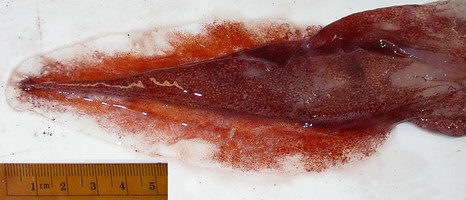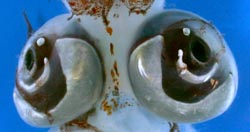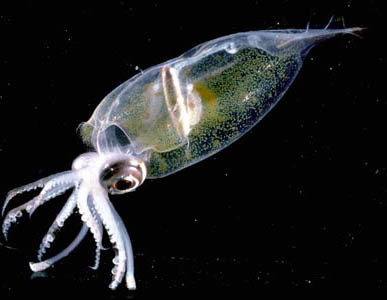Teuthowenia
Richard E. Young and Katharina M. Mangold (1922-2003)- Teuthowenia megalops Prosch 1947
- Teuthowenia maculata Leach 1817
- Teuthowenia pellucida (Chun 1910)
Introduction
Species of Teuthowenia are moderate-sized (140-380 mm gladius length), midwater cranchiids. Each species occupies a separate region of the world's oceans where primary productivity is relatively high. Paralarvae occupy near-surface waters until they reach a relatively large size of 50-100 mm ML.

Figure. Lateral view of T. megalops in the "cockatoo" posture. Video still frame from a videotape recorded in-situ (Vecchione and Roper, 1991), JOHNSON SEA-LINK I submersible dive 2141; 4 August 1987; New England; depth = 789 m; temp. = 4.8° C; ML = 137 mm. An AVI format video clip of this animal is available at Cephalopods in Action
Brief diagnosis:
A taoniin ...
- with three photophores on eyeball.
- with anterior third of fins attaching to mantle.
Characteristics
- Tentacles
- Club with suckers.
- Stalk with four series of suckers and pads in distal 1/2 to 2/3.*
- Funnel
- Funnel valve absent.
- Funel organ: Dorsal pad with three papillae.
- Mantle
- Tubercles present (1-4) at funnel-mantle fusion.
- Fin
- Anterior third or more inserts on mantle (in subadults) rather than shell-sac of gladius.***
 Click on an image to view larger version & data in a new window
Click on an image to view larger version & data in a new window
Figure. Ventral view of the fin of T. megalops, showing fin shape. Photograph by M. Vecchione.
- Photophores
- Three photophores on each eye.**
- Photophores present on all arm tips of mature females.
 Click on an image to view larger version & data in a new window
Click on an image to view larger version & data in a new window

Figure. Left - Ventral and lateral views of an eye of T. maculata, 123 mm ML, showing ocular photophores. from Voss (1985, p. 33, fig. 8c,d). Right - Ventral view of the eyes of T. megalops, 134 mm ML, North Atlantic. Photographed during the MarEco cruise on the R/V G. O. SARS by R. Young.
*Unique in family but see Bathothauma and Megalocranchia.
**Unique in family.
***Unusual in family; shared with Egea.
Comments
Characteristics are from Voss (1980).
Life history
The best known species is T. pellucida. Juveniles begin an ontogenetic descent reaching bathypelagic depths as adults where they mate and spawn. Peculiar glands develop on the mantle of females at maturity that may produce a pheromone (Voss, 1985). In the dark, spacious waters of the bathypelagic zone locating a mate can be difficult. Presumably the production of a chemical attractant (pheromone) combined with the luminescence provided by the arm-tip photophores solves this problem. During mating discharged spermatophores (spermatangia) attach to the dorsal surface of the female then penetrate through the mantle wall and apparently discharge sperm into the mantle cavity (Voss, 1985). Females apparently spawn once then die.
Distribution
The three species appear to have non-overlapping distributions (Voss, 1985). Teuthowenia megalops occupies the subarctic and temperate waters of the north Atlantic Ocean. Teuthowenia maculata is found in the tropical waters of the eastern Atlantic Ocean. Teuthowenia pellucida occupies circum-global waters in the region of the subtropical convergence in the southern hemisphere.
References
Vecchione, M. and C. F. E. Roper. 1991. Cephalopods observed from submersibles in the western North Atlantic. Bulletin of Marine Science 49(1-2):433-445.
Voss, N. A. 1980. A generic revision of the Cranchiidae (Cephalopoda; Oegopsida). Bull. Mar. Sci. 30: 365-412.
Voss, N. A. 1985. Systematics, biology and biogeography of the cranchiid cephalopod genus Teuthowenia (Oegopsida). Bull. Mar. Sci. 36: 1-85.
About This Page
Drawings from Voss (1985) printed with the Permission of the Bulletin of Marine Science.

University of Hawaii, Honolulu, HI, USA
Katharina M. Mangold (1922-2003)

Laboratoire Arago, Banyuls-Sur-Mer, France
Page copyright © 2016 and Katharina M. Mangold (1922-2003)
 Page: Tree of Life
Teuthowenia .
Authored by
Richard E. Young and Katharina M. Mangold (1922-2003).
The TEXT of this page is licensed under the
Creative Commons Attribution-NonCommercial License - Version 3.0. Note that images and other media
featured on this page are each governed by their own license, and they may or may not be available
for reuse. Click on an image or a media link to access the media data window, which provides the
relevant licensing information. For the general terms and conditions of ToL material reuse and
redistribution, please see the Tree of Life Copyright
Policies.
Page: Tree of Life
Teuthowenia .
Authored by
Richard E. Young and Katharina M. Mangold (1922-2003).
The TEXT of this page is licensed under the
Creative Commons Attribution-NonCommercial License - Version 3.0. Note that images and other media
featured on this page are each governed by their own license, and they may or may not be available
for reuse. Click on an image or a media link to access the media data window, which provides the
relevant licensing information. For the general terms and conditions of ToL material reuse and
redistribution, please see the Tree of Life Copyright
Policies.
- Content changed 16 July 2006
Citing this page:
Young, Richard E. and Katharina M. Mangold (1922-2003). 2006. Teuthowenia . Version 16 July 2006. http://tolweb.org/Teuthowenia/19560/2006.07.16 in The Tree of Life Web Project, http://tolweb.org/














 Go to quick links
Go to quick search
Go to navigation for this section of the ToL site
Go to detailed links for the ToL site
Go to quick links
Go to quick search
Go to navigation for this section of the ToL site
Go to detailed links for the ToL site